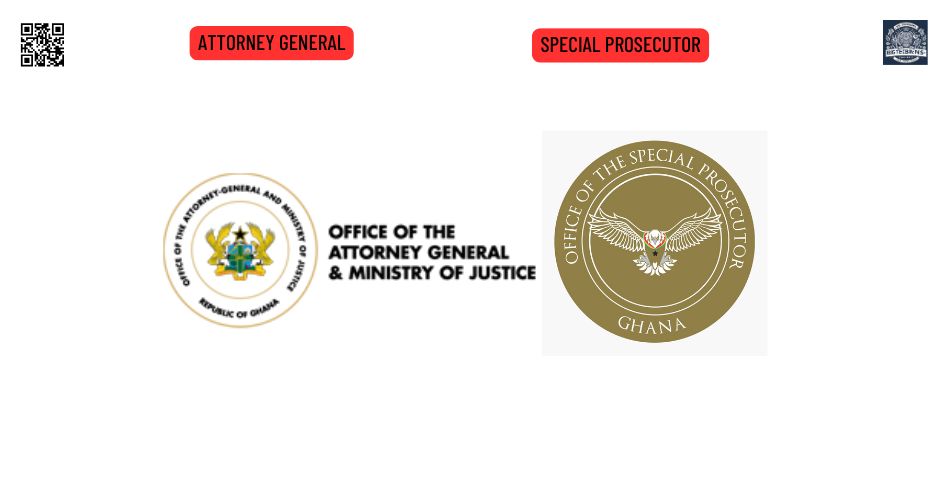Introduction
The legal and judicial framework of Ghana includes key institutions like the Attorney General (AG) and the Special Prosecutor (SP), whose mandates collectively ensure accountability, justice, and the rule of law. This blog delves into their ranks, job roles, accountability structures, and the differences in their operations while tracing their historical evolution.
Historical Overview
Attorney General’s Position:

The position of the Attorney General dates back to the colonial era. It became a constitutional office under the 1957 Independence Constitution. The AG’s responsibilities have evolved to encompass prosecutorial powers and legal advisory roles for the government.
Special Prosecutor’s Office:

The Office of the Special Prosecutor (OSP) was established in 2017 under the Office of the Special Prosecutor Act, 2017 (Act 959) as part of Ghana’s anti-corruption reforms. The creation of this independent office was driven by the need to reduce political interference in prosecuting corruption-related cases.
Roles and Responsibilities
Attorney General
Rank and Office:
- The AG is both the government’s principal legal advisor and the Minister of Justice, making the position a cabinet-level appointment.
Key Roles:
- Provides legal advice to the President and government departments.
- Drafts laws for parliamentary approval.
- Oversees public prosecutions and defends the state in legal matters.
- Supervises legal institutions like the Registrar General’s Department.
Accountability:
- The AG reports to the President of Ghana and Parliament on legal matters affecting the government. Their powers are rooted in Article 88 of the 1992 Constitution.
Special Prosecutor
Rank and Office:
- The SP heads an independent entity tasked specifically with combating corruption. The office is outside direct executive control to avoid undue political influence.
Key Roles:
- Investigates and prosecutes corruption-related offenses.
- Recovers proceeds from corruption.
- Promotes transparency in public institutions.
Accountability:
- The SP operates independently but submits annual reports to Parliament, ensuring transparency and oversight. The President appoints the SP with parliamentary approval.
Differences in Operations
| Feature | Attorney General | Special Prosecutor |
| 1. Mandate | General legal advisory and prosecution for the state. | Focused solely on investigating and prosecuting corruption. |
| 2. Scope of Work | Covers all criminal and civil matters for the state. | Limited to corruption-related cases. |
| 3. Accountability | Reports directly to the President and Parliament. | Reports only to Parliament; operates independently. |
| 4. Independence | Part of the executive branch and cabinet. | Independent of executive control. |
| 5. Legislation | Governed by Article 88 of the Constitution. | Governed by Act 959 of 2017. |
Relationship Between the AG and SP
Although the SP derives its prosecutorial authority from the AG, the office is independent in practice. The AG’s overarching prosecutorial authority ensures coordination in cases requiring broader government legal involvement.
Offices Working Under Each Role
Attorney General
- Registrar General’s Department.
- Drafting Unit (for legislative proposals).
- Public Prosecution Division.
Special Prosecutor
- Investigation Unit.
- Asset Recovery Division.
- Anti-Corruption Education and Advocacy Unit.
Offices They Are Accountable To
Attorney General:
- Accountable to the President and Parliament for all legal matters related to governance.
Special Prosecutor:
- Accountable to Parliament for the execution of its anti-corruption mandate and the effective utilization of resources.
Key Milestones
- 1957: Attorney General’s office established at independence.
- 2017: Special Prosecutor’s office created to tackle corruption.
- 2021: Godfred Yeboah Dame appointed Attorney General; Kissi Agyebeng appointed Special Prosecutor.
Conclusion
The Attorney General and Special Prosecutor represent complementary pillars in Ghana’s legal system. While the AG oversees a wide array of legal matters for the government, the SP ensures an independent and focused approach to combating corruption. Their collaborative yet distinct roles are crucial for promoting good governance, accountability, and the rule of law in Ghana.
FAQs: Attorney General (AG) and Special Prosecutor (SP) in Ghana
1. What is the role of the Attorney General in Ghana?
- The Attorney General (AG) serves as the government’s principal legal advisor, oversees public prosecutions, drafts laws, and represents the state in legal matters. The AG also heads the Ministry of Justice.
2. Who appoints the Attorney General in Ghana?
- The President of Ghana appoints the Attorney General, subject to parliamentary approval.
3. What is the role of the Special Prosecutor in Ghana?
- The Special Prosecutor (SP) investigates and prosecutes corruption-related offenses independently. The SP’s mandate is to combat corruption within public institutions and recover misappropriated assets.
4. How is the Special Prosecutor’s Office different from the Attorney General’s Department?
- While the AG handles all legal matters for the state, the SP focuses exclusively on anti-corruption efforts. Additionally, the SP operates independently of the executive branch, whereas the AG is part of the President’s cabinet.
5. Under which ministry does the Special Prosecutor work?
- The Special Prosecutor operates independently but collaborates with the Ministry of Justice for prosecutorial authority, as per the law.
6. What laws govern the Attorney General and the Special Prosecutor in Ghana?
- The Attorney General’s duties are outlined in Article 88 of the 1992 Constitution, while the Special Prosecutor operates under the Office of the Special Prosecutor Act, 2017 (Act 959).
7. Are the Attorney General and the Special Prosecutor accountable to the same authority?
- No. The Attorney General is accountable to the President and Parliament, whereas the Special Prosecutor reports primarily to Parliament.
8. Can the Special Prosecutor prosecute without the Attorney General’s consent?
- Yes. Though the SP derives prosecutorial powers from the AG, the SP acts independently in corruption-related cases.
9. What institutions work under the Attorney General’s Office?
- Key institutions include the Registrar General’s Department, Public Prosecution Division, and the Drafting Unit.
10. Who is the current Attorney General and Special Prosecutor in Ghana?
- As of 2024, Godfred Yeboah Dame is the Attorney General, and Kissi Agyebeng is the Special Prosecutor
11. What challenges have the AG and SP faced in Ghana?
- Challenges include political interference, resource constraints, and delays in legal processes, particularly for high-profile corruption cases.
References
- Ghana’s 1992 Constitution, Article 88 (Attorney General’s mandate).
- Office of the Special Prosecutor Act, 2017 (Act 959).
- Government of Ghana, Ministry of Justice and Attorney General’s Department official website.
- Anti-Corruption Research by Transparency International (on Ghana’s legal framework).
- Parliament of Ghana Reports on Special Prosecutor’s Office (2022).

